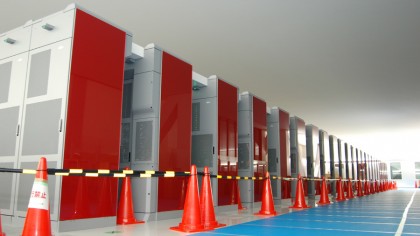When will Singularity happen – and will it turn Earth into heaven or hell?
Some think that artificial brains will overtake humans in 2045
Is Singularity pure sci-fi?
"It has more of a foot in the world of sci-fi than in the present reality," says Owen, who points out that we still struggle with keeping websites from crashing. "Singularity discussions typically veer towards worries about the rise of a 'Skynet' – the AI that turned robotic armies on humanity in Terminator – themes that are definitely the province of fiction."
However, despite being a far cry from rampant AIs like Skynet and HAL 9000, there's something about the nature of hardware innovation so far that suggests that we need to know about Singularity. "The point is that, if this does happen, it will happen suddenly," says Owen. "Attempts to generate predictions of a super-intelligence in this century are therefore virtually complete speculation."
Logically, an artificial brain modelled on a human brain would have the same values. "We might reasonably expect its reactions to match ours, and therefore our values and morality," says Owen, who poses a couple more scenarios that Singularity could bring – that a 'brain' might create itself, or that humans might create something that's not like a human brain.
For some, Singularity is the arrival of an AI that is equal to the human brain. "True artificial intelligence would be a recreation of the human thought process – a man-made machine with our intellectual abilities," says Curran. "This would include the ability to learn just about anything, the ability to reason, the ability to use language and the ability to formulate original ideas … we are nowhere near achieving this level."

How long will it take before we get an artificial brain equal to the human brain?
It's unclear – and, so far, it's proving impossible for computers to get near to human-scale thinking. In August 2013 neuroscientists at the Okinawa Institute of Technology Graduate University (OIST) and Forschungszentrum Jülich in Germany used Japan's K Computer – one of the world's top supercomputers – to attempt to mimic a human brain's activity.
Using the open source NEST simulation software, they simulated a network of 1.73 billion nerve cells connected by 10.4 trillion synapses. Doing so used 82,944 processors of the K computer, and it took 40 minutes to simulate a single second's worth of neuronal network activity in a real, biological human brain. In total, the simulation used a petabyte of memory, which is about the same as 250,000 PCs. So while the Singularity isn't close, the human brain can already be simulated, and Moore's Law means that it will become much easier quite quickly.
The research was connected to a project aiming to understand the neural control of movement and the mechanism of Parkinson's disease, which raises an interesting point – the creation of an artificial brain will probably be a by-product of specific medical research, and certainly not as part of some ambition to create the end of humanity.
Are you a pro? Subscribe to our newsletter
Sign up to the TechRadar Pro newsletter to get all the top news, opinion, features and guidance your business needs to succeed!
However, simulating a human brain and creating an artificial version are two philosophically very different things. "Achieving something like 'thinking' could be far more intractable than we suppose," says Owen. "There is an excessive fascination with making systems or algorithms that work 'like the brain' … this is neither necessary nor sufficient for an intelligence."
The Singularity – whether it comes in 2045 or much later – might sound like sci-fi, but the era of digital immortality and of human's being surpassed by machines could arrive without much warning. It's the most difficult trend to predict, but what would the post-Singularity world be like? "Heaven or hell – there's no middle ground," says Owen. "It will be completely transformational in the long term … it's either part of a transcendence or an apocalypse."
The human brain has proved to be the ultimate thinking machine for two billion years; does it really only have 30 years left at the top of the evolutionary tree? If and when it comes, Singularity may have a sweetener – digital immortality for all of us.
Jamie is a freelance tech, travel and space journalist based in the UK. He’s been writing regularly for Techradar since it was launched in 2008 and also writes regularly for Forbes, The Telegraph, the South China Morning Post, Sky & Telescope and the Sky At Night magazine as well as other Future titles T3, Digital Camera World, All About Space and Space.com. He also edits two of his own websites, TravGear.com and WhenIsTheNextEclipse.com that reflect his obsession with travel gear and solar eclipse travel. He is the author of A Stargazing Program For Beginners (Springer, 2015),
